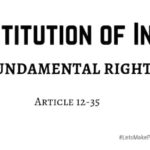Indian Constitution
Articles of Indian constitution
PART I
Articles of Indian Constitution PART 1 – (Article 1 to 4)
Deals with union of India and Union Territories of India, i e., Formation, creation and alteration of state
Article 1: Union of India
Article 2: Creation of states
Article 3: Formation of States
Article 4: Amendment changes in Articles 2,3, Schedule 1 and Schedule 4
Article 1: Name and Territory of the union
India i e., Bharath
India is union of states, which implies that Indian Federation is not result of Agreement between center and state. So states cannot go away from union
Indian Federation is result of agreement as well as disagreement i e., Integration as well as disintegration
Article 2: Establishment of new states
India can transfer some of its territories to foreign countries and we can also admits foreign territories to Indian union
Article 3: Formation of new new states and alternation of areas, boundaries or names of existing states
Article 3 includes,
i) Formation of sates is done by separation of state territory from existing state and by uniting two states
ii) Diminishing the Area of states
iii) Increasing the area of states
iv) Change the name of the sates
v) Reorganization of states
Procedure:
The Bill relating to above stated may be introduce in either houses of parliament. But No such bill shall be introduced without recommendation of president of India.
President of India before giving his permission will refer the bill to the state which affected. The opinion expressed by the state legislature may or may not be taken into consideration. After that the parliament approves the bill(both the house) with simple majority
Both the house has to approve the bill with simple majority separately. In case of conflict, bill gets defeated. If no conflict, president of India will gives his assent then the procedure is tend to be completed
Note: Territorial integrity of state depends on will and wish of the parliament. This is Anti Federal Feature
Article 4: Laws made under articles 2 and 3 to provide for the amendment of the first and the fourth schedules and supplemental, incident and consequential matters
It says if any amendment made to Article 2, Article 3, Schedule 1 and Schedule 4 get amended
Note: Any amendment made to constitution by simple majority is not deemed to be constitutional amendment
Short Notes on Formation Linguistic State:
The demand for linguistic state is as old as national movement
S.K.Dhar Commission (1947-48)
Constituent Assembly appointed commission under the chairmanship of S.K.Dhar to consider the demand for linguistic state. But this commission rejected the demand for linguistic state on base of language
J.V.P Committee (1948)
This committee appointed or constituted by Congress party. This committee also rejected the demand for linguistic state but it opined that the demand of Telugu may be considered as special case
After the death of Potti Sriramulu, 58 days fast onto death central government(Prime Minister Nehru) announced formation of Andra Rashtra from Madras
It Came to existence on 1st Oct 1953, with kurnool as its capital
State Reorganization commission SRC(1953)
In 1953, central government appointed states reorganization committee(SRC) under chairmanship of Fazl Ali. This commission submitted report in 1955
This commission recommended future reorganization of states on bases of languages. Accordingly parliament of India made sates reorganization act of 1953 along 7th constitutional amendment. As a result Andhra Pradesh state formed on 1st Nov 1956 with Hyderabad as capital
Different Indian states formation years
| Year | Amendments | States formed |
| 1956 | 7th Amendment | Andhra Pradesh |
| 1962 | 12th Amendment | Goa, Daman and Diu |
| 1962 | 13th Amendment | Status of state to Nagaland |
| 1962 | 14th Amendment | Puducherry |
| 1974 | 35th Amendment | Status of an associate states of Indian union to Sikkim |
| 1975 | 36th Amendment | Status of state to Sikkim |
| 1960 | – | Gujarat |
| 1966 | – | Haryana |
| 1971 | – | Himachal Pradesh |
| 1972 | – | Manipur |
| 1972 | – | Tripura |
| 1972 | – | Meghalaya |
| 1987 | – | Mizoram |
| 1987 | – | Arunachal Pradesh |
| 1987 | – | Goa |
| 2000 | – | Chattisgarh |
| 2000 | – | Uttarkhand |
| 2000 | – | Jharkhand |
| 2014 | – | Telangana |
Indian Articles of the Constitution
PART II
Article 5: Citizenship at the commencement of constitution
Article 6: Rights of citizenship of certain persons who have migrated to India from Pakistan
Article 7: Rights of citizenship of certain migrants to Pakistan
Article 8: Rights of citizenship of certain persons of Indian origin residing outside India
Article 9: Persons voluntarily acquiring citizenship of foreign state not be citizens
Article 10: Continuance of the right of citizenship
Article 11: Parliament of regulate the right of citizenship by law
Article 5: Citizenship at the commencement of constitution
In general there will be two kinds of people in very countries- citizens, non citizens
Citizen: Person who have direct relation with government and entitlement of all political rights.
Note: India provides only single citizenship which is anti federal feature
Modes of acquiring citizenship of India
a) By Birth
b) By Descent
c) By Registration
d) By Materialization
e) By acquiring a foreign territory
By Birth:
Those who are born in or after 26 Jan 1950 but before 1 July 1987 are citizens of India by Birth irrespective of nationality of their parents.
Those who are born in India on or after 1st July 1987 are also citizens of India provided either of parents must be Indian citizens
By Descent(By Blood):
Those born outside India on or after 26 Jan 1950 but before 10th Dec 1992 are citizens of India by descent provided father was citizen of India
However, this was relaxed after 1992 and held that either of parents are Indian
Note: If an person acquires Indian citizenship either by birth or blood is called Natural citizens
By Naturalization:
A Foreigner is ordinary resident of India for 10 year and who as fulfilled all the condition of eligibility like permanent employment, learning one Indian language, having a good character and integrity and he is eligible to get India citizenship
Example: Mother Theresa
By Registration:
A foreigner can also acquire Indian citizenship by registration, If he/she married to Indian citizen by through registration.
Note: Min 5yrs to stay in India
By Acquire a Foreign territory:
If any foreign territory is merged into India, people of that area will automatically becomes citizens of India
Example: Goa, Ponducherry
Loss of Indian Citizenship
there are 2 methods
i) Voluntary
ii) Involuntary
Voluntary: An citizen of full age and capacity can voluntary renounced
Involuntary: It include deprivation i. e., If person acquired Indian citizenship by fraud or unlawfully way by suppressing facts
(or)
If any citizens who as show himself by act or speech to be disloyal to constitution of India
(or)
If any citizens during the war unlawfully communicated or traded information to enemy country means he is also deprived
Dual citizenship 2005
NRI: Any citizen who is outside India continuously 182 days is regarded as NRI
PIO: Person of Indian Origin
The citizen who settled outside India and he is possessing the passport of other country is called PIO
PIO- Second generation of NRI
Facilitating of Dual Citizenship
In 2004, Govt of India made amendment to citizenship Act known as Overseas citizenship of India (OCI) which was subsequently amended in 2005. According to that, persons who have a dual citizenship of India and Foreign countries are subjected to Indian Laws
These citizens will avail the facilitating in India like ordinary citizen of India
The Advantage:
a) They don’t require Visa to travel to India
b) They need not go through registration formulaties like foreigners
c) They can invest in any field including real estate expect agriculture land
d) There childrens are admitted into all education institutions like ordinary citizens
e) They were given rights to vote in general election like ordinary citizens of India from 2004 November on-wards
Note: Manju R. Jehu is 1st PIO who listed for dual citizenship of India
In 2004, Ministry of non resident of India was created and subsequently it renamed as Ministry of overseas Affairs
Learn More
Link 1 – Making of Indian constitution | Acts | Articles | Amendments
Link 2 – Physics | Biology | Indian History | T-History MCQ Questions Test papers
Link 3- Buy/Download Physics MCQ Bit Bank eBook
Link 4 – Free eBooks For Competitive Exams
Link 5 – Top Books for Competitive Exams
Link 6 – Download Quantitative and Aptitude Competitive Exams
For Complete GK/GS – Click Here
Related Search

